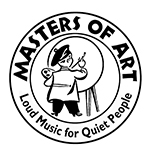19th March 2019

The Operatic Voice is not really my cup of tea. The Operatic Voice is generally too much for me; it’s too loud and too dramatic. Opera singers are trained to produce an astonishing volume of sound while still producing a beautiful tone. They are supposed to be heard at the back of a gigantic opera house, without using a mic, and over the racket made by a large orchestra knocking seven bells of hell out of some grand climax, and this requires extraordinary sound-penetrating qualities. An operatic Tenor I knew referred to this piercing quality as ‘the blade’. You had to have ‘the blade’.
The singers who produce this operatic voice are astonishing musicians, awesome vocal athletes and dedicated, sensitive artists, but, to my coarse and uncultured ears, their performances often come over as a lot of shrieking and bellowing. I sympathize with the story of John Gielgud who was directing an opera production and wished to address the cast during a rehearsal. Advancing on the stage while the cast were still at full throttle, and failing to attract their attention, he cried, ‘Oh do stop that dreadful singing!’
I find it much easier to appreciate other aspects of the formally Trained Voice. The ‘Church’ voice is a different animal from the ‘Opera’ voice, I love the quieter, sweeter tones of the singers, both male and female, who generally perform in a liturgical setting, while a soprano or contralto performing wordless music with melismatic pure sound, can be miraculous. Bachianas Brasileiras #5 by Villa Lobos, for example, features a wordless soprano in one of its various arrangements, and is a transcendent experience. In his ‘Sinfonia Antartica’, Vaughan Williams pulls the same stunt with magical results, as does Holst in ‘The Planets’. However, these are women’s voices; your Tenors and Basses, it seems, always have to be singing about something, well they’re men…
An opera is a sung play. Characters, in opera, are supposedly communicating with other characters on the stage, and are also communicating to the audience. They have to sing words, but in the operatic tradition they enunciate them in a very particular and peculiar way so as not to compromise their precious tone.
The comprehensibility of sung opera probably varies depending on the language of the text; some languages have vowels that are more compatible with operatic enunciation than others. Italians can probably understand a lot of what is being sung in Italian, and my guess is that German operatic audiences can also follow most of what’s going on. In English, however things do not work so well.
Many opera singers work admirably hard to make an English libretto as clear as possible, but when a few lines, usually of recitative, can be understood, it often sounds ridiculous because opera singers are trained to pronounce English words in the most exaggeratedly ‘posh’ or aristocratic manner imaginable. I have confessed in an earlier post that I, myself, use a slightly ‘poshed-up’ accent to perform in, because it makes our wonderful, but infuriating, language easier to sing, but Operatic diction in English makes Jacob Rees-Mogg sound common as muck. All the dramatis personae in an opera are sung in this ridiculously toffee-nosed manner, so that working class, or servant characters are sung with the cut-glass accents of members of the House of Lords circa 1850.
Sadly, this emphasis on volume and tone means that Opera sung in English is mostly unintelligible; both to me, and, it seems, to many other people. I put forward, as evidence, that fact that opera productions performed in English, in the UK, frequently have the words projected above the stage as ‘surtitles’.
I should re-state this situation, as it is so bizarre. English-speaking audiences, listening to performers singing in English, need to have the words there in front of them because no one can understand what the performers are singing.
What is wrong with this picture?
For this reason, most operas, are performed in the language in which they were composed. ‘Boris Godunov’ sung in English sounds about as intelligible as ‘Boris Godunov’ sung in Russian so what would be the point of translating it?
An opera fan would protest that it’s all about the music, not the words. Fair enough: but if opera is supposed to be experienced as a piece of Total Art, a Gesamtkunstwerk, it doesn’t help if a significant part of the kunst doesn’t werk properly.

